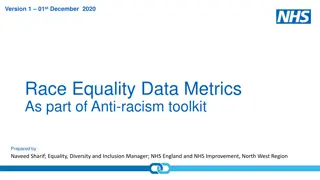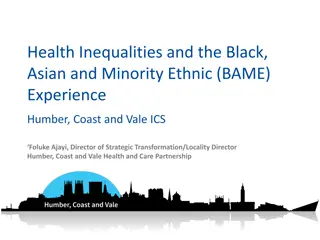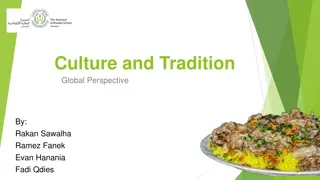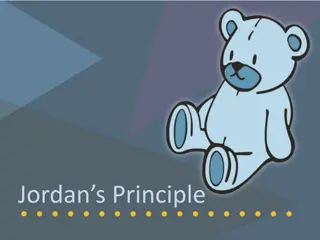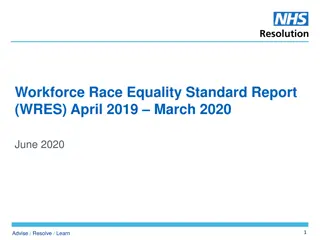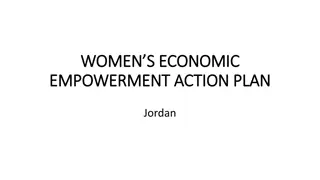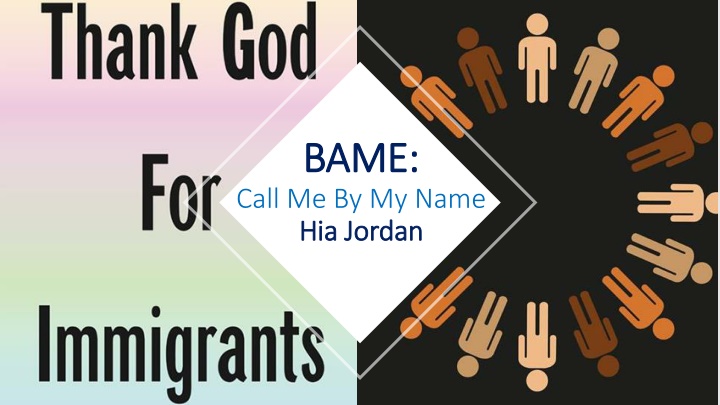
The Evolution and Critique of the BAME Term in Contemporary Britain
Explore the origins and development of the BAME term, its significance in the context of race and identity, and the criticisms it faces regarding homogenization and lack of cultural specificity. Delve into the complexities of identity politics and the challenges of achieving true inclusivity in today's society.
Download Presentation

Please find below an Image/Link to download the presentation.
The content on the website is provided AS IS for your information and personal use only. It may not be sold, licensed, or shared on other websites without obtaining consent from the author. If you encounter any issues during the download, it is possible that the publisher has removed the file from their server.
You are allowed to download the files provided on this website for personal or commercial use, subject to the condition that they are used lawfully. All files are the property of their respective owners.
The content on the website is provided AS IS for your information and personal use only. It may not be sold, licensed, or shared on other websites without obtaining consent from the author.
E N D
Presentation Transcript
BAME: BAME: Call Me By My Name Hia Hia Jordan Jordan
The categorisation of the human race is not a new phenomenon The term race first emerged in the English language in the late 16th century . So, these stereotypes have endured through the ages and while this was just the start of the race science . The term BAME in Britain today has it s roots back in the political blackness movement in the 1960 s and 1970 s . BAME: The Origins
Kenan Malik writing in the Observer in July 2020 says: when I was growing up, I saw myself as and was seen by others as black . In the 1980 s it was a political term denoting a sense of a common struggle against racism. Over time as identities have become less political and more ethnic or cultural so the meaning of black has changed. BAME: Current context While some (mostly those in positions of power and control) see BAME as a means of articulating the feeling of commonality that black once denoted, it is not able to resurrect that unity. Data from my research illustrates this when participant 3 says in response to the BAME question:
P3 said: I dont like the term; it rhymes with lame or tame. I have a specific identity and I have a community that I belong to. The problem with BAME is that people from the commonwealth are all being pushed together but culture and race will and always be specific, so why pretend that its one homogenous group. You can t achieve equality by coming up with an acronym. I also think that the term being an umbrella for all groups is misleading as in my experience most of the content is heavily African Caribbean led but not in way that sparks one s curiosity. For example, I am not interested in food, or black history or fashion or hairstyles exclusively, to me the discussion needs to have a broader appeal and one which is interesting to follow, something that may inspire me to visit the place or learn more about a particular aspect. So, for me it doesn t appeal. I find the topics are repeated and whoever is responsible for designing the content got the chapters on cuisine and, music and fashion just got stuck and didn t finish the book! It s frustrating so say if the BAME staff network did something on Gandhi, I d be interested in BAME: Current context learning about his early life in Africa, the land, the people the part of Durban that he lived in etc, etc . but what I get is the same repeats which I know about already so it s just boring. The bigger problem is that the corporate side of things wants a quick tick box exercise to say to themselves look at us, how inclusive we are! I think in my experience the people that can really make a change are only interested in their own legacy building formulas, this way the status quo remains intact. So, no thank you, I know who I am and that is not BAME. The BAME of today serves as an administrative function
The BAME of today serves as an administrative function, it has no solidarity, commonality or political leverage. The Government s own Deputy Director of the Race Disparity unit Zamila Bunglawala wrote in a blog published in 2019: that a study of 300 people across the UK found only a couple recognised the terms BAME and BME and only one knew vaguely what they stood for BAME: Current Context There is also a problem that the terms BAME and BME aren t always associated with white ethnic minorities . Other commentators on BAME and BME also pointed out that the terms can be generic and fail to address the racial discrimination that you have in terms of anti-blackness in the Black, Asian and Arab communities
These encounters of categorisation run deep amongst BAME social work professionals .. Jeffrey Boake writing in his book Black, Listed: Black British culture explored (2019) says: Call me black and I will get a complex knot of pride and insecurity tightening in my psyche. it s a word that reminds me than I am lesser than and different from, but it is also a source of self-affirmation. Boake goes onto exploring ways in which people with darker skin are located in language .. BAME : A new language
Final Thoughts: Final Thoughts: I do not think we are going to stop classifying people according to certain criteria which is politically led. While we do not need new categories to understand each other what we do need to do is to find ways to exist better together. Race is a story which is handed down and handed around so its up to all of us to choose the stories that we tell so next time you see me as BAME, call me by my name.


